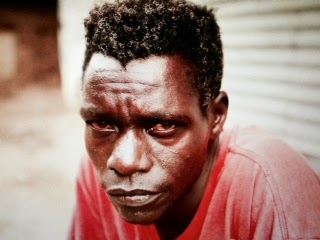For any filmmakers winnings and losses come in different guises. Not getting the sound kit to work on the first day of filming is probably a bit like having a terrible hand on your first round of the night. But on the other hand, having excellent local fixers is like having a good streak throughout the game. That of course is more than luck though; by the time I arrived last week Dave - never one to do things by halves - had already put together a shooting schedule and hired two local fixers to introduce us to potential characters and to translate. “Isn’t he cool,” I say to Dave referring to one of them, called John. “I think in a past life he used to be a cat,” replies Dave and that pretty much sums John up. A former fisherman he knows and is loved by everyone. Our other fixer is called Salmon, a beautifully articulate and polite man who slightly ironically is afraid of being on the lake.
And what about making a film with your boyfriend who’s on his first shoot? Well, we’ve both blown a fuse once or twice, because filming is always stressful, and with no commissioners, bosses or budget you can only rely on your own judgement. But for the most the two of us have formed an efficient good cop bad cop team: “I like being a producer, it allows me to be bossy and organised,” says Dave. Guess who’s the bad cop.
The real jackpot though for anyone trying to shoot stuff is finding good characters, people like Asha and Ezekiel. A gambling fisherman who lives with no care of tomorrow, behind Ezekiel’s ragged clothes and blood-shot eyes is a bright mind being slowly destroyed by the illicit brew he downs like water. “It’s to stay warm,” he explains swallowing a glassful just before setting on the waters. The fishermen here work from sunset to sunrise using kerosene lanterns to attract small fish called omena. Most of these men come from landlocked villages and so they never learnt to swim. “Parasites” says Asha, a 28-year-old mother when asked to describe some of the men. It’s a strong word but as a boat manager she’s regularly forced to sleep with fishermen to keep them working on her boat.
In a different world these honest, flawed and brave people could be our friends. It’s easy to see Ezekiel’s brightness, jokey and articulate in English despite not having used the language for twenty years. There is a wisdom in Aisha that makes me feel she could be twice my age, not three years my younger. Maybe it’s a waste of energy to imagine a world where poverty doesn’t drive people into desperation but it’s a way of finding common ground. You win or you lose but crucially it’s two way traffic. Poverty simply isn’t a winning hand so there’s no nicety to end on but understanding the life choices that people make because of it and knowing the potential that lies behind it, well, maybe that’s one tiny step closer to something better.









